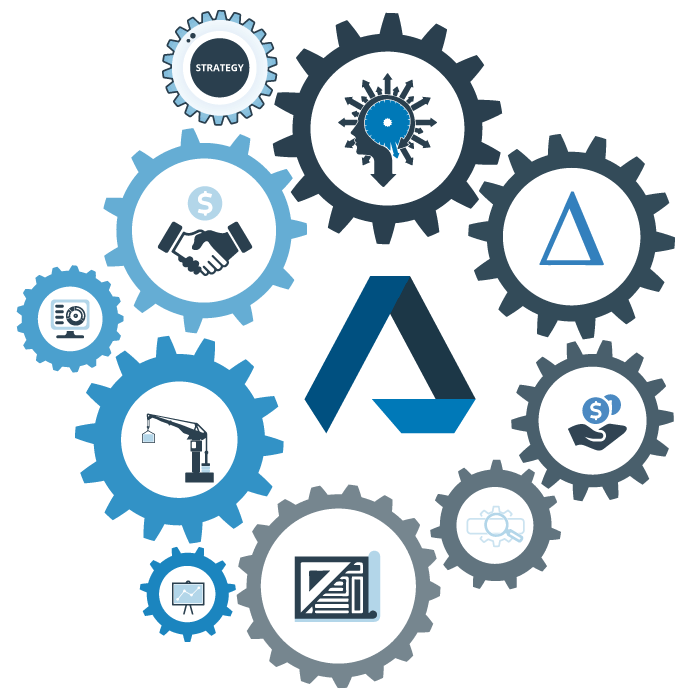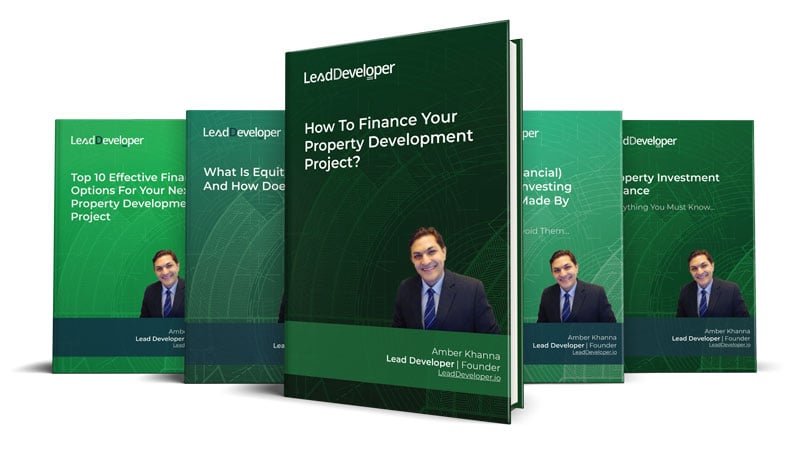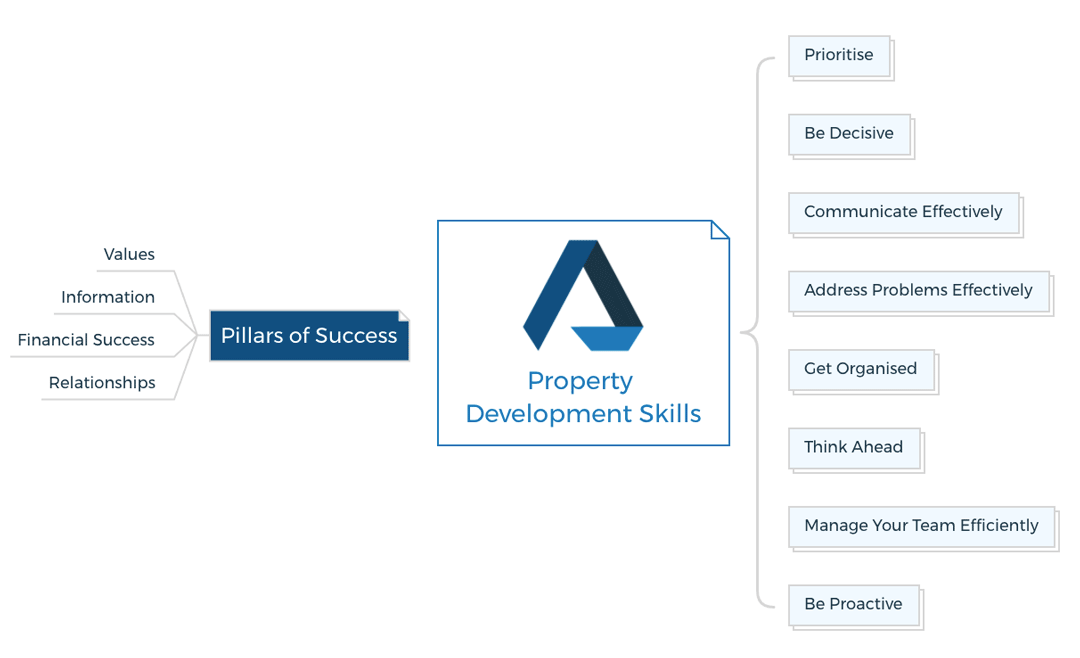8 Skills every property developer must have for success in property development
If you are thinking about how to get started in the property development business. In that case, you must have these 8 key attributes & skills needed for property development before you sign up for a property development course online. Let’s get a quick idea about what it takes to be a successful property developer.

8 Easy skills needed for property development
Property development skill # 1 - Prioritise
As any property development course will tell you, identifying the correct order to complete tasks is crucial in this field. Do not schedule tasks depending on how easily you can get them done. Instead, focus on what has to be done first and get to those tasks on a priority basis.
Property development skill # 2 - Be decisive
To succeed in property development, you need to move in on a good deal and close it quickly. Being decisive is a vital attribute to develop. As a beginner, this can be difficult because you lack confidence in your property development skills and the ability to recognise a good deal.
Use your previous experiences or the guidance of an experienced property development mentor to help you make quick, accurate decisions.
Property development skill # 3 - Communicate effectively
Being articulate and communicating your requirements without any ambiguity is a very useful skill for any property developer. You have to convey what you need to many professionals, architects, engineers, surveyors and others.
Effective communication skills ensure that there is no mismatch between what you need and what those working on your project understand.
Property development skill # 4 - Address problems effectively
In the property market, complexities crop up at various stages. Call upon your expertise and past knowledge to handle them head-on and resolve them quickly.
Your approach to the problem plays a significant role in how quickly and efficiently you can rectify it. Some issues may require you to look at the bigger picture to identify the source, while others need to focus on working around the problem.
Property development skill # 5 - Get organised
Your property development course will tell you about the million things that need to be done when closing a deal. If you are organised with a plan of action, a to-do list and a schedule, you can get most of it done with ease.
Getting organised for doing the right things at the right time and managing your time to get everything done every day is a valuable skill.
Property development skill # 6 - Think ahead
If you are exploring how to become a property developer, you are probably aware that this can be a high-risk profession if you ignore what is happening in the marketplace.
At all times, you need to pay attention to various indicators and trends that tell you what to expect in the coming times. With an understanding of the market’s current dynamics, think ahead to determine the potential of the property you are interested in.
That’s not all; with each project, you take up, be proactive about assessing and addressing the possible issues that may crop up to ensure that your projects stay on track always.
Property development skill # 7 - Manage your team efficiently
Property development is a successful endeavour when every member of your team is efficient and reliable. This happens only when you manage to get the best from each of them, ensure that there is perfect communication within the team and that they are all motivated towards the common goal.
You need to be a team player and to nurture the team spirit in every one of your colleagues, too.
How To Finance Your Property Development Project?
And Other Books On
Real Estate Development Finance
Includes 5 x detailed eBooks

✓ Property Development Finance: Easily Finance Your Project? (26 Pages)
✓ 10 Big (Financial) Property Investing Mistakes Made By Investors (58 Pages)
✓ 10 Finance Options For Your Next Property Development Project (29 Pages)
✓ What Is Equity Finance And How Does It Work? (42 Pages)
✓ Property Investment Finance - Ultimate Guide
Property development skill # 8 - Be proactive
Projects on hand and in the pipeline need constant attention and as a developer, you do not have the luxury of keeping some of them on the back-burner while you focus on others.
Neither can you afford to invest attention in time only when problems crop up because this may prove to be costly for you. Be proactive with respect to your projects and keep reviewing them all in succession every single day so that you always know what’s going on.

4 Pillars of property development success
A project does not appear out of thin air; it is the outcome of a process that involves all stakeholders and frequently results in a project that is not the same as the original concept.
Real estate development is the common ground of developers, consumers, and communities: Equilibrium is achieved through appreciation of joint objectives rather than confrontation and pursuit of total victory.
As a real estate development project progresses, the developer strives to achieve this balance of shared goals. Along with the above essential property developer skills needed for property development, a successful real estate developer also focuses on four essential elements to achieving this goal throughout development.
They can be summed up in the four statements below:
- Development is a value-based profession where the developer builds a project that reflects fundamental beliefs.
- The accumulation of information reduces uncertainty in development, which is an information-driven process.
- Development is a capital-intensive business with high upfront costs and risks, necessitating ongoing testing and evaluation of a project’s financial sustainability as new information becomes available.
- Development is a relationship-based industry where honesty and trustworthiness are essential for success.
Values
Development is, first and foremost, a value-based process. “Is this a development that I will be proud of?” should be asked at the start and end.
I offer the following advice to aspiring developers: “Begin with something you admire.” Every project represents the developer’s values. Is the developer attempting to foster a sense of community ownership?
Do the developer’s plans represent reasonable long-term land use? Is the developer considerate to others?
Good intentions often collide with reality. For example, financial constraints may degrade a developer’s values-driven aim. An experienced developer, on the other hand, is always aware of the relationship between values and product and raises the question, “Is this project turning out to be what I planned when I started?” as the project progresses. Is this a project with which I’d like to be associated?”
Information
Obtaining information and addressing uncertainty is critical to the property development success of a real estate development project. However, information usually comes at a cost—if not in dollars, then in time.
As a result, the developer is constantly asking himself, “Is the cost of acquiring more information to reduce risk worth the risk of losing money?”
Because each development project is its own business, the developer requires a lot of information exclusive to that project.
Each project has its location, target market, design, budget, and timeline. Obtaining this information takes time and money for each project. Throughout the project, the developer is focused on five areas of investigation:
- Site evaluation: What are the site’s physical, environmental, and legal conditions?
- Market support: What prices, absorption rates, and product mix will the market support?
- Community Support and development conditions: What is the community’s degree of support, how long will it take to approve a development, and what conditions will the community place on approval?
- Product and project design: What product configurations, site designs, and project designs match the location, respond to the market, are in line with community needs, and are cost-effective to build?
Costs of construction: How much will it cost to build the project as proposed, and what is the best approach to shaping the design to be built cheaply?
Financial success
In most cases, it is difficult to develop without the assistance of loans and investment capital from outside sources; developers must show that a project is profitable enough to repay its lenders and investors.
Few, if any, projects may make this demonstration until they have completed a significant portion of the pre-development information collecting phase and resolved the majority of the viability issues, resulting in answers to the following questions:
- What is the project’s profitability if it is built, and what are the costs of getting it ready to offer to finance sources?
- What are the different types of financing options (equity and debt, temporary and permanent, private and public)?
- What are the costs of obtaining capital, both loan and equity, and how will the costs and availability of capital fluctuate over the development period?
Developers construct a financial proforma to answer these issues, which models a project’s financial performance, including capital expenses, funding sources, and application of funding to project phases throughout time.
A real estate project’s funding might originate from three different places:
- The developer’s own financial and asset resources, which cover all or a portion of the pre-development expenses, the “co-investment” requirements, and any recourse needs
- A lending source that is secured by a lien on the property
- An external equity source that invests in the project to earn a profit based on the project’s success.
Good developers understand how to assess a project’s financial viability from the beginning as part of site acquisition and due diligence, and they keep doing so as new information and decisions emerge during the development process.
How a developer evaluates and conveys results about a real estate project’s viability influences whether it can raise funds needed to move forward.
Relationships
At its foundation, property development is a relationship-based industry. A real estate developer collaborates with lenders, architects, contractors, consultants, community representatives, and customers and only succeeds if all of these parties believe in the developer.
“Will I preserve and enhance relationships of trust with other stakeholders in my actions on this project?” should be the developer’s question in this dimension.
In a real estate project, stakeholders’ needs are different and may conflict. Lenders and investors demand a return on cash and a return on investment, putting pressure on businesses to cut expenses and increase revenue.
The landowner expects the purchase contract to be fulfilled, putting pressure on the buyer to close the property before all necessary approvals are received. Communities increasingly impose broad development criteria, putting pressure on expenses to rise.
Members of the project team, such as architects and contractors, expect to share their knowledge to reach a common goal. Even if their needs may contradict, a developer with the abilities and vision to generate high-quality projects understands how to form trusting connections with all of these stakeholders.
Values, information, financial viability, and relationships are all interconnected. Value-driven developers are drawn to those who share their values. Information-driven judgments are more dependable, which improves the project’s financial viability.
Projects that are financially viable prosper, and the developer’s reputation for integrity grows. Property developer success is achieved when all of the factors work together.
FAQs
What is the difference between a developer and a contractor?
Usually, the developer raises financing, purchases the property, and completes the project. The real estate company is usually a general contractor in charge of the project's construction.
What makes a good property developer?
The top property developers have outstanding interpersonal and communication abilities. They can connect with individuals from various walks of life and establish good relations swiftly.

